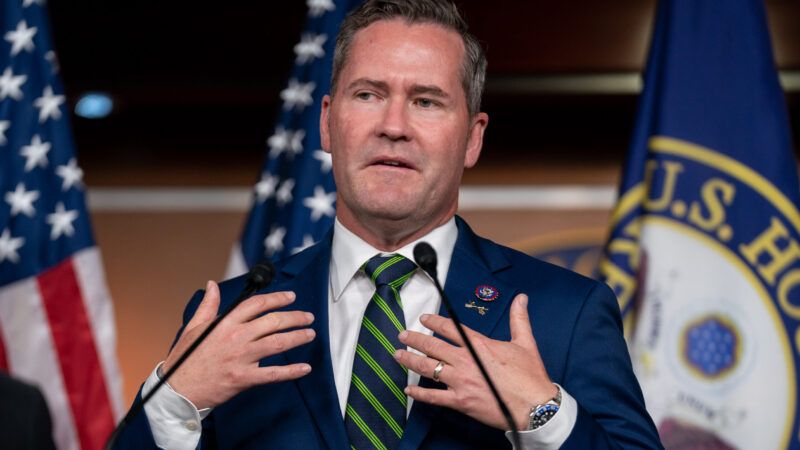This Congressman Wants the U.S. To Use Military Force Against Mexican Cartels
Like other authorizations for the use of military force—or AUMFs—it would be an unnecessary, unwise expansion of executive power.

Last week, Mexican government forces clashed with cartel members in a deadly scene at the airport in Culiacán, Sinaloa. The shootouts, which followed a government operation to apprehend Ovidio Guzmán, son of drug kingpin Joaquin "El Chapo" Guzmán, left a reported 30 people dead. Other towns in Sinaloa saw upticks in cartel violence after Ovidio Guzmán's arrest.
One interventionist congressman thinks the solution is American military might. Speaking about the cartel violence, Rep. Mike Waltz (R–Fla.) told Fox News host Maria Bartiromo on Sunday that "we need to go on offense against them" since "the cartels are destabilizing our neighbor" and "running our border." Waltz said that he'll introduce "legislation to authorize the use of military force against these cartels."
That wouldn't involve sending U.S. troops the fight the cartels, Waltz stipulated—but an American military response might include "cyber, drones, intelligence assets, naval assets." It echoes a pitch from former President Donald Trump last week to "take down the cartels" by ordering "the Department of Defense to make appropriate use of special forces, cyber warfare, and other overt and covert actions."
There are plenty of reasons to be skeptical about Waltz's plan. For one, an authorization for the use of military force (AUMF) would give the president a blank check to put American assets on the line in a conflict where Congress hasn't declared war. Per the Constitution, the president has no authority to declare war, and only Congress can authorize and appropriate funds for a conflict. Though AUMFs often explicitly pertain to only one conflict or country, presidents have manipulated them to justify a bevy of unrelated military engagements. A cartel-related AUMF could very well see some mission creep.
Those concerns aside, Waltz thinks the U.S. has a proven track record when it comes to fighting drug cartels. "We've done this before," he told Bartiromo. "Back in the '80s when the cartels in Colombia were shooting down planes, killing members of Congress, about to take over the entire Colombian government, we had Plan Colombia then. We had special operations training."
Plan Colombia, a Clinton administration strategy to cut drug trafficking and promote development in the country, was costly and yielded mixed results (no thanks to its mission creep, as it shifted to focus more on counterterrorism). The U.S. had spent "about $12 billion in bilateral aid to implement Plan Colombia" since 2000, according to a 2021 Congressional Research Service report. As Cato Institute Policy Analyst Daniel Raisbeck has written for Reason, "Plan Colombia's anti-narcotics element was an unqualified failure" and guerrilla fighters "still control large swathes of the cocaine business." The realities of using American military assets to beat back violent actors tied to the drug trade simply don't bode well for Waltz's plan.
Representatives should rebuff Waltz's effort to entrench the U.S. military in yet another conflict and instead continue ongoing efforts to repeal other AUMFs. Last June, the House voted to repeal the 1957 and 1991 AUMFs, which authorized the president to fight communist influence in the Middle East and enter the Gulf War in Iraq, respectively. Those measures didn't advance. A measure to repeal the 2002 AUMF—which authorized the president to use force against Saddam Hussein in Iraq—was eventually stripped from the National Defense Authorization Act for 2023. The 2001 AUMF continues to undergird U.S. military involvement two decades after its adoption, despite some legislative repeal efforts.
Putting American military assets on the line in Mexico—even if no U.S. troops are involved—would be a mistake. The president shouldn't have more tools at his disposal to recklessly enter foreign conflicts, and members of Congress would only be giving him a blank check to meddle in Mexico's affairs by adopting an AUMF.

Show Comments (152)